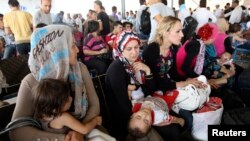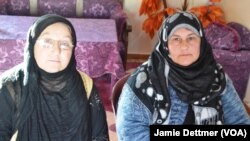QAMISHLI, SYRIA —
Sexual violence against women has skyrocketed in Syria since the outbreak of the two-and-half year civil war, say rights campaigners, who in the chaotic circumstances of the brutal conflict have been trying to document cases. And advocates for women say all too often incidents of sexual violence against women are swept under the carpet because of a sense shame or fear victims will be killed to save their families’ honor. But, in Syria’s Kurdistan local women activists are trying to help abused women and change attitudes.
Elehma Omar is a mother of four and grandmother of a thirteen-year-old girl. For a year now she and other volunteers at a women’s center in a quiet residential area of Qamishli, the Kurdish-dominated Northeast’s largest town, have been seeking to counsel abused women and women suffering from domestic violence and even to intervene to protect teenage girls being forced to marry much older men by parents desperate for money.
“I was a housewife before the war but I thought I had to help women – all women regardless of whether they are Kurd, Arab or Christian,” she says.
Earlier this week, to coincide with the International Day to End Violence Against Women, the Euro-Mediterranean Human Rights Network issued a report warning that Syria’s war has “created a context ripe for violence against women, including sexual violence.” The report detailed cases of women having been raped in detention, used as human shields during military operations and kidnapped to pressure and humiliate family members. Sexual violence and rape has been used as a weapon of war to terrify and punish, says the report.
"Abuses against women [have been used as a] deliberate tactic to defeat the other party from a symbolic and psychological perspective, making women desirable targets as the conflict rages on," according to the report.
In Syria’s Kurdistan al-Qaida-affiliated militiamen inflicted a reign of terror earlier this year on towns and villages they occupied until forced out of many by Kurdish fighters. Women were often targeted.
“They claim to be Muslim and they have their rigid religious codes when it comes to women’s modesty and dress but is it Muslim to believe a man can place his hand on a woman’s head, intone three times Allahu Akbar and then claim the woman as his wife?” That is what jihadists were doing, she said.
In Qamishli and other towns women were kidnapped by jihadists or criminal groups for ransom and if returned had often been raped, the volunteers at the center say.
In a swath of the northeast freed of jihadists now there is relative calm with internal security and policing of the area handled by the People’s Protection Units, or YPG. But that doesn’t mean abuse of women has stopped, says women’s center director Omar. In wartime, she notes, women have it particularly hard.
Child brides and honor killings
Rapes still occur and so too the marrying off of teenage girls. When they hear of proposed marriages involving underage girls, the center seeks to intervene and to persuade families not to go ahead.
“It is a problem in all of Syria, including in Kurdistan. We have a family who sold their 17-year-old daughter to a 70-year-old man,” says Omar shaking her hijab-covered head. For her and her deputy Shehanaz Amin the most distressing cases involve rape and their efforts to stop honor killings. There have been five known honor killings in Syria’s Kurdistan this year but local activists suspect there have been dozens more.
The stigma of sexual assault runs deep in Syrian culture as it does across the Middle East; rape is shaming and casts dishonor. For the women’s center rape cases pose a terrible dilemma – the activists’ priority is to ensure a raped woman isn’t killed to safe family honor. The only alternative, they say, is to persuade the rapist and raped to marry – an awful, torturous prospect for an abused woman, they acknowledge. “Otherwise they would be killed,” says Amin sadly.
The same dilemma has faced women in volunteer Kurdish police units. Naline Kozi, the thirty-year-old commander of a 50-strong all-women internal security unit in Qamishli, says she has had to handle five cases of rape in the last few months. “We keep the girls to protect them from their families and until we manage to get the men to marry them,” she says.
“The choice is between honor killing and marriage. We know that it is hard and we know it is unjust but in our opinion, it is all we can do,” she sighs.
Elehma Omar is a mother of four and grandmother of a thirteen-year-old girl. For a year now she and other volunteers at a women’s center in a quiet residential area of Qamishli, the Kurdish-dominated Northeast’s largest town, have been seeking to counsel abused women and women suffering from domestic violence and even to intervene to protect teenage girls being forced to marry much older men by parents desperate for money.
“I was a housewife before the war but I thought I had to help women – all women regardless of whether they are Kurd, Arab or Christian,” she says.
Earlier this week, to coincide with the International Day to End Violence Against Women, the Euro-Mediterranean Human Rights Network issued a report warning that Syria’s war has “created a context ripe for violence against women, including sexual violence.” The report detailed cases of women having been raped in detention, used as human shields during military operations and kidnapped to pressure and humiliate family members. Sexual violence and rape has been used as a weapon of war to terrify and punish, says the report.
"Abuses against women [have been used as a] deliberate tactic to defeat the other party from a symbolic and psychological perspective, making women desirable targets as the conflict rages on," according to the report.
In Syria’s Kurdistan al-Qaida-affiliated militiamen inflicted a reign of terror earlier this year on towns and villages they occupied until forced out of many by Kurdish fighters. Women were often targeted.
“They claim to be Muslim and they have their rigid religious codes when it comes to women’s modesty and dress but is it Muslim to believe a man can place his hand on a woman’s head, intone three times Allahu Akbar and then claim the woman as his wife?” That is what jihadists were doing, she said.
In Qamishli and other towns women were kidnapped by jihadists or criminal groups for ransom and if returned had often been raped, the volunteers at the center say.
In a swath of the northeast freed of jihadists now there is relative calm with internal security and policing of the area handled by the People’s Protection Units, or YPG. But that doesn’t mean abuse of women has stopped, says women’s center director Omar. In wartime, she notes, women have it particularly hard.
Child brides and honor killings
Rapes still occur and so too the marrying off of teenage girls. When they hear of proposed marriages involving underage girls, the center seeks to intervene and to persuade families not to go ahead.
“It is a problem in all of Syria, including in Kurdistan. We have a family who sold their 17-year-old daughter to a 70-year-old man,” says Omar shaking her hijab-covered head. For her and her deputy Shehanaz Amin the most distressing cases involve rape and their efforts to stop honor killings. There have been five known honor killings in Syria’s Kurdistan this year but local activists suspect there have been dozens more.
The stigma of sexual assault runs deep in Syrian culture as it does across the Middle East; rape is shaming and casts dishonor. For the women’s center rape cases pose a terrible dilemma – the activists’ priority is to ensure a raped woman isn’t killed to safe family honor. The only alternative, they say, is to persuade the rapist and raped to marry – an awful, torturous prospect for an abused woman, they acknowledge. “Otherwise they would be killed,” says Amin sadly.
The same dilemma has faced women in volunteer Kurdish police units. Naline Kozi, the thirty-year-old commander of a 50-strong all-women internal security unit in Qamishli, says she has had to handle five cases of rape in the last few months. “We keep the girls to protect them from their families and until we manage to get the men to marry them,” she says.
“The choice is between honor killing and marriage. We know that it is hard and we know it is unjust but in our opinion, it is all we can do,” she sighs.





